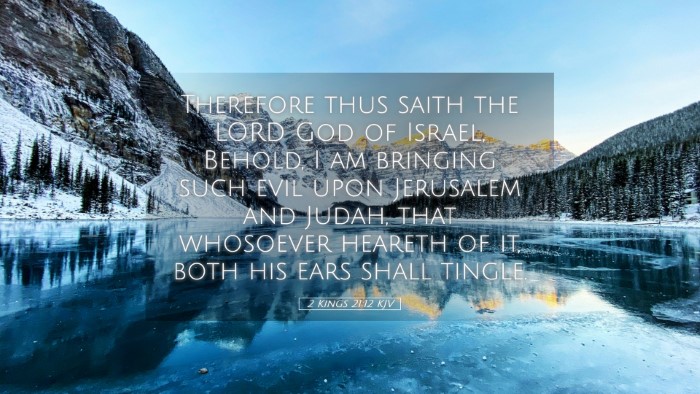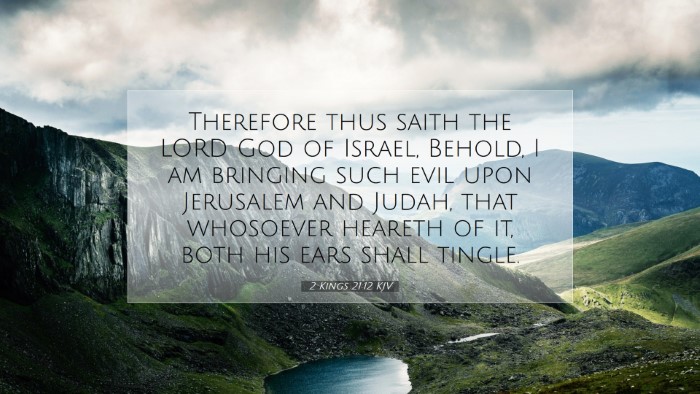Commentary on 2 Kings 21:12
Verse: "Therefore thus says the Lord God of Israel, ‘Behold, I am bringing such calamity upon Jerusalem and Judah, that whoever hears of it, both his ears will tingle.’" (2 Kings 21:12, NKJV)
Introduction
This verse occurs in a critical juncture in the history of Judah, underscoring the dire consequences of unfaithfulness to God. King Manasseh's reign is characterized by a profound departure from the worship of Yahweh, leading to cumulative spiritual and social decay. The commentaries shed light on the profound implications of this verse in the broader narrative of the kingdom of Judah amidst divine judgement.
Historical Context
Manasseh, one of the most notorious kings, reigned for fifty-five years, during which he introduced various forms of idolatry into Judah. His actions directly contravened the covenant established with the people of Israel. The commentary from Matthew Henry emphasizes that his reign culminated in such wickedness that God's patience was exhausted, setting the stage for impending judgment.
Divine Judgment and the Ears Tingling
The phrase "his ears will tingle" suggests a profound shock or horror at the calamity about to befall Jerusalem and Judah. Albert Barnes notes that this expression implies an unbearable message regarding the severity of God's judgement, which was to serve as a wake-up call for the people. It symbolizes a devastating message that would reverberate throughout the land, instilling fear and dread concerning the consequences of sin.
The Essential Theme of Repentance
Amidst the warnings of judgement, the wider narrative calls for repentance and a return to God. Adam Clarke comments that while God is righteous and just in His punishment, His heart remains inclined toward mercy. The stark warning delivered to the people through the prophet encapsulates the balance between divine justice and the possibility of redemption, should the people turn back to their covenant with Yahweh.
Implications for Leaders
The lessons from 2 Kings 21:12 are particularly relevant for leaders and spiritual guides. Matthew Henry reflects that leaders bear a collective responsibility for the spiritual health of their communities. With Manasseh leading the people astray and corrupting worship practices, the ramifications of his rule serve as a poignant reminder that leaders must remain vigilant in upholding the tenets of faith and righteousness.
Expectations from God
The sincerity of God's pronouncements through this verse confronts the issue of divine expectations from His people. Albert Barnes emphasizes that the character of God does not change, and the standards He set at Sinai still resonate in the hearts of the faithful. The gravity of abandonment by Israel is met with an equally significant divine response, equipping serious reflection on the covenant relationship between God and His people, calling them to return to His ways.
The Prophetic Voice
The role of the prophet is crucial in delivering such difficult messages. Commentators highlight the prophetic significance of warning the people before the oncoming judgment. Adam Clarke asserts that effective prophetic ministry must unflinchingly call out sin while offering the hope of redemption. The prophet’s role reflects the balance of truth and grace, illustrating how God longs for His people to heed the warnings and turn from their wickedness.
Conclusion
In summary, 2 Kings 21:12 serves as a foundational reminder of the consequences of sin, the compassion of God, and the call for repentance. The insights derived from public domain commentaries enrich our understanding of the text, empowering pastors, theologians, and students alike to grapple with complexities of faithfulness to God amidst cultural and spiritual crises. The echo of God's judgment is not just a historical reflection; it is a timeless message inviting introspection and a return to covenant faithfulness.


